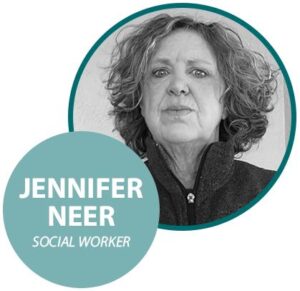A Day in the Life of a Social Worker
Interview with Jennifer Neer
Within the social work field, there are many different sub-specialists that are committed to working with a specific demographic or issue. Jennifer Neer, licensed social worker at Winnebago Mental Health Institute, is a prime example of one of these specialists. In her work as a psychiatric social worker, Jennifer plays a critical role in the patient’s journey to continued wellness. She secures resources and additional treatment that will help the patient succeed in post-treatment life.
Keep reading to find out more about Jennifer’s story and this fascinating field of work.
1. What initially attracted you to a career as a social worker?
 I would have to say that I came to the conclusion that a career in social work was right for me after I had a progression of jobs working with people. Before I got my social work license, I had the opportunity to work with autistic children in my school district and with survivors of domestic violence. It was from these experiences that I realized I had a passion for working with people. However, I didn’t immediately make a career transition after having these jobs. Around 2012, I was working in the insurance industry and there was a reduction in force at my company. I was left without at job. At the same time, there were personal circumstances that led me to reevaluate my life. It was then that I decided I wanted to purse a license in social work.
I would have to say that I came to the conclusion that a career in social work was right for me after I had a progression of jobs working with people. Before I got my social work license, I had the opportunity to work with autistic children in my school district and with survivors of domestic violence. It was from these experiences that I realized I had a passion for working with people. However, I didn’t immediately make a career transition after having these jobs. Around 2012, I was working in the insurance industry and there was a reduction in force at my company. I was left without at job. At the same time, there were personal circumstances that led me to reevaluate my life. It was then that I decided I wanted to purse a license in social work.
2. How did you come to work in the psychiatric field?
One of the recruiters from Premier Medical Staffing Services connected with me on LinkedIn about an opportunity at the Winnebago Mental Health Institute. At the time, I wasn’t look for a social work position, but the recruiter was so charismatic and passionate about the opportunity that I was willing to learn more. As I found out more about the position and interviewed with people at the facility, I knew that this opportunity was the right fit for me.
3. In your current position, what do your responsibilities entail?
In my current position, I work as part of a multi-disciplinary team with patients that have been involuntarily committed for psychological evaluation and treatment. A major portion of my work is getting to understand the patient’s needs and getting resources into place that will assist the patient once they are discharged from the facility.
Another big aspect of my job is understanding the legal process that is happening and making sure that the patient’s legal rights are protected. This means that I frequently attend legal proceedings with the patient so that I can better help them understand and meet the requirements that are set.
4. What does your typical day look like?
 Generally speaking, the first thing I do each morning is look over the patients that are on my roster and decide what tasks I am going to accomplish that day. Then I print out the list of new admissions, either from the night or weekend before, and start organizing my paperwork so that I can have an initial meeting with them. Each day, I attend a morning staff meeting with my team where we review important patient developments and milestones. Based on the information that is covered there, I may need to adjust my schedule for the day. After our staff meeting is over, I begin meeting with patients. Depending on the information that I am able to get from them and where they are in the process, I may need to spend time making phone calls to other counties, family members (if there is a release of information in place) and doctors to get a better understanding of their medical history. New admissions and discharges are sprinkled in throughout my day as well.
Generally speaking, the first thing I do each morning is look over the patients that are on my roster and decide what tasks I am going to accomplish that day. Then I print out the list of new admissions, either from the night or weekend before, and start organizing my paperwork so that I can have an initial meeting with them. Each day, I attend a morning staff meeting with my team where we review important patient developments and milestones. Based on the information that is covered there, I may need to adjust my schedule for the day. After our staff meeting is over, I begin meeting with patients. Depending on the information that I am able to get from them and where they are in the process, I may need to spend time making phone calls to other counties, family members (if there is a release of information in place) and doctors to get a better understanding of their medical history. New admissions and discharges are sprinkled in throughout my day as well.
5. How would you describe your typical interactions with patients?
Patients come to us in various mental states. For instance, some patients are extremely lucid, and you can easily have a full-fledged conversation with them. Others can be catatonic, completely unable to speak. For that reason, I would say that there is no “typical” patient interaction that I have. Each person is unique and must be met and helped where they are at.
That being said, the goal of each of my interactions with my patients is to gather more information about their needs. As I learn more about the person’s medical conditions and their lifestyle, I am better able to connect them with agencies and community resources that will support them outside of the facility. For instance, we recently had a patient come to us that was very concerned about the welfare of his cat while he was getting treatment. After I learned this, I was able to connect with the local Humane Society. They were able to retrieve the cat and provide it with the care it needed until the patient was released. It gave the patient great peace of mind to know that his beloved fur baby was okay.
The goal of each of my interactions with my patients is to gather more information about their needs. As I learn more about the person’s medical conditions and their lifestyle, I am better able to connect them with agencies and community resources that will support them outside of the facility.
6. What are some of the challenges of working as a social worker?
One of the toughest challenges of working as a social worker is having a patient that doesn’t recognize they need help. It’s extremely difficult to try to persuade someone to change when they don’t think they have a problem, when they think their decisions are healthy and rational. This is often the case with patients that are involuntarily committed for psychiatric help. They generally don’t realize that they are not in good place mentally, emotionally and/or physically. They need special help and care to understand why the decisions they have made are not in the best interest of themselves or others.
Another challenge of working as a social worker is making sure that your patient’s legal rights are satisfied within the prescribed time frame. While the legal process is the same for every patient, executing or applying that process in a way that meets a patient’s specific needs and circumstances can be challenging, especially when you are up against a clock.
7. What are some of the benefits of working as a social worker?
As a social worker, it is extremely humbling and rewarding to know that you are helping someone who is at their most vulnerable point. For instance, there recently was a teenage girl that was discharged from our facility. From the time she was admitted until the time she left, you could she a total transformation in the way she thought and behaved. Knowing that I played a role in her healing and that I was able to connect her with services and tools to make that change sustainable, is an experience unlike any other. Social work truly is a career for those who get personal satisfaction out of helping other people succeed.
As a social worker, it is extremely humbling and rewarding to know that you are helping someone who is at their most vulnerable point.
8. Social work is a demanding career that doesn’t always offer a happy ending. How do you maintain your passion and enthusiasm for the profession?
My ability to maintain my passion and enthusiasm for social work stems from my commitment to having a work/life balance. When I’m at work, I work hard. I give it my all. I am relentless in making sure my patients have the resources they need to go on and succeed in life after treatment. However, when I leave work for the day, I leave that day’s problems, concerns and worries at the door on my way out (or I try my best to do that). As a social worker, you naturally become invested in another person’s struggles. For that reason, you need to have relationships and hobbies outside of work that make you feel good and successful. For me, spending time with my family, friends and dogs and getting out and exercising are ways that I safeguard my mental and physical health.
9. What would you say is the biggest misconception people have about a career as a social worker?
I think the biggest misconception people have about social workers, especially those that are in my line of work, is that we are looking to lock people up and throw away the key. The truth is, no matter what state our patient is in, our end goal is always the same. It’s to get our patients healthy and successfully functioning within their communities again.
Growing up, I didn’t really know or understand what social workers did. I thought it was more of a “fluffy” job. However, time and experience has taught me otherwise. A social worker comes into a person’s life when they are at their lowest point. They are willing to walk alongside that person and help them reach a better place, no matter what obstacles or challenges arise. Our patients are dealing with real issues that have serious consequences. This is not a job for the faint of heart or easily discouraged.
10. What characteristics do you believe a social worker needs to succeed in this field?
To be successful in this field, you will need to have copious amounts of caring and empathy, a genuine desire to help others do better. You will need to understand human nature and that for various reasons, people can’t or won’t always make the best decisions for themselves or others.
I also think it’s incredibly important to be in tune with yourself. As a social worker, most days you will give more than you get. For that reason, it’s important to have a pulse on how you’re doing mentally, emotionally and physically and to be willing to take care of yourself as issues arise. Longevity in this career is dependent upon knowing how to put gas in your own tank.
11. What piece of advice would you give to a new social worker?
 I think the best piece of advice that I could give a new social worker is to not feel like you need to know all the answers. Social work is a constantly evolving field. There is always something new to learn. For that reason, get to know your team. Ask them questions. Seek out a mentor that can help guide you through your first months on the job. At some point in your career, you will undoubtedly come up against a patient that has needs that are outside your area of knowledge. In those instances, don’t be afraid to recognize your limitations and to ask for help. Your colleagues truly want to see you and your patients succeed.
I think the best piece of advice that I could give a new social worker is to not feel like you need to know all the answers. Social work is a constantly evolving field. There is always something new to learn. For that reason, get to know your team. Ask them questions. Seek out a mentor that can help guide you through your first months on the job. At some point in your career, you will undoubtedly come up against a patient that has needs that are outside your area of knowledge. In those instances, don’t be afraid to recognize your limitations and to ask for help. Your colleagues truly want to see you and your patients succeed.
Social Worker Resources
Organization – Council on Social Work Education
Organization – National Association of Social Workers
Publication – Social Work
Publication – Social Work Today
Publication – The New Social Worker Online
If you would like to learn more about social work opportunities or would like to speak with a social worker about their experience, complete the form below and we’ll be in touch soon.
Click here to explore our available jobs.